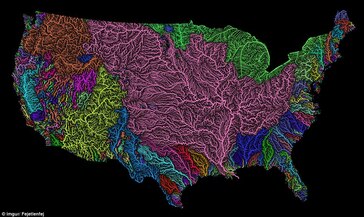
Back in 2016, Daily Mail published a map of the U.S., with rivers showing how water connects us all. When I saw this, I saw a body with veins. Mother Earth on whom we live. This particular map was created by Fejetlenfej, a geographer using open-source QGIS software. We are interconnected. A poor person in rural Kansas and another in urban New Orleans share a vein--share life--in a very real, material, tangible way. The spiritual and material are one. And though this map seems to respect national borders, our shared circulatory system doesn't. Texas and Mexico share water. New York and Ontario. Without clean water we die. Water is life, and sustainable water practices are essential.
Nearly billion people lack access to clean water, and 2.5 billion lack adequate sanitation, according to CDC. For many, this means increased disease and death. But what can we do as teachers? Many songs discuss water, and can open space for important conversations about issues around water pollution, clean water access, sanitation, and our interconnectedness. Artists & Climate Change website includes an article on the Algonquin Water Song. Here's an extended quote from the article: "Our water is under siege from pollution, climate change, mismanagement and corporate environmental disaster. Without clean water, we cannot live. In Native American, and many other Indigenous cultures, women are the Keepers of the Water, and men are the Keepers of Fire. In recent months, many brave women who are Water Protectors have captured the attention of the world whether at Standing Rock, attempting to stop the pipelines, or Flint, Michigan, demanding clean water for their children, or ever-increasing battlegrounds of environmental disaster. The Elders have understood since the beginning of time that clean water is essential for the survival of all living beings, and they continue to fight for Mother Earth’s most precious resource. Now, they are asking women to join them for one minute a day to sing to the water. It is incumbent for all of us, especially the women, to help them raise awareness and protect the water for future generations."
What songs might your students know about water? What cultural traditions might they bring to school? What water traditions do their families practice? How can we help students love the water, and truly understand how precious it is? What are some popular songs, band, choir, or orchestra pieces that open conversation around these important water issues? Comment below.
DJS
 RSS Feed
RSS Feed
